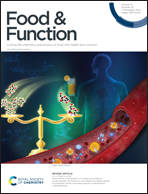Live and pasteurized Akkermansia muciniphila attenuate hyperuricemia in mice through modulating uric acid metabolism, inflammation, and gut microbiota†
Abstract
Akkermansia muciniphila (A. muciniphila) has been demonstrated to exhibit beneficial effects against various metabolic diseases, but whether A. muciniphila has an anti-hyperuricemia effect remains unexplored. In this study, live and pasteurized A. muciniphila were examined for their efficacy in alleviating hyperuricemia in mice. Live and pasteurized A. muciniphila (approximately 2 × 108 CFU) were given to a hyperuricemic mice model via oral gavage for three weeks. Both forms of A. muciniphila decreased serum urate and inhibited xanthine oxidase in the liver. In addition, fecal and urinal urate was increased in both treatment groups, which corresponds to the changes in the mRNA and protein expression levels of renal uric acid-related transporters (URAT1, GLUT9, and ABCG2) and intestinal ABCG2. Both forms of bacteria reduced the mRNA expression of inflammatory factors in the liver, kidneys and colon. Live A. muciniphila enhanced the expression of tight junction proteins and improved the dysbiosis of intestinal flora. These findings suggest that both live or pasteurized A. muciniphila could effectively attenuate hyperuricemia by moderating uric acid metabolism and inflammation, and live bacteria exhibit additional beneficial effects on the gut microbiota. These findings highlight that A. muciniphila could be potentially developed as a probiotic or postbiotic to combat hyperuricemia.



 Please wait while we load your content...
Please wait while we load your content...